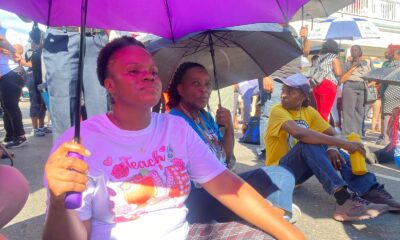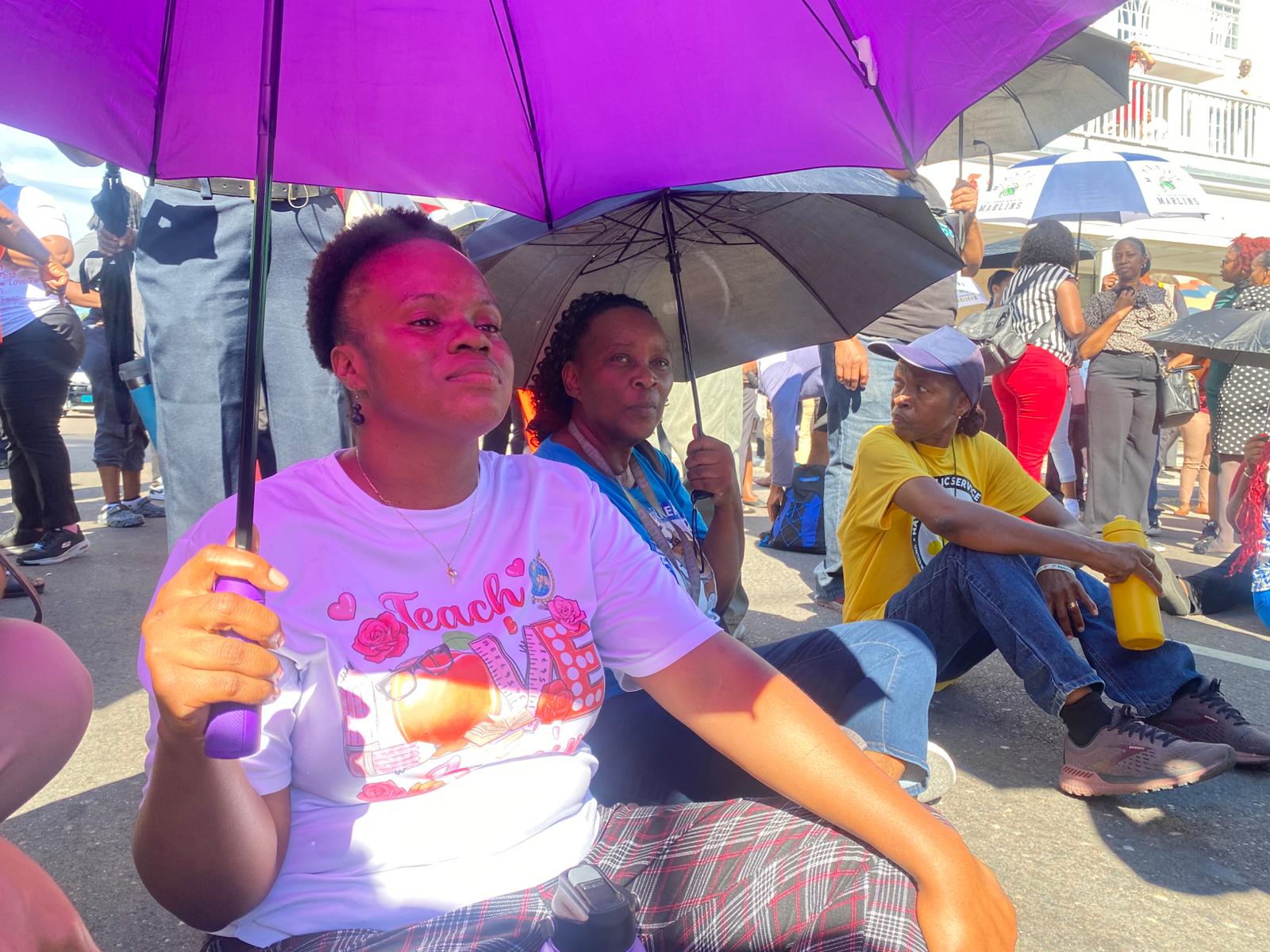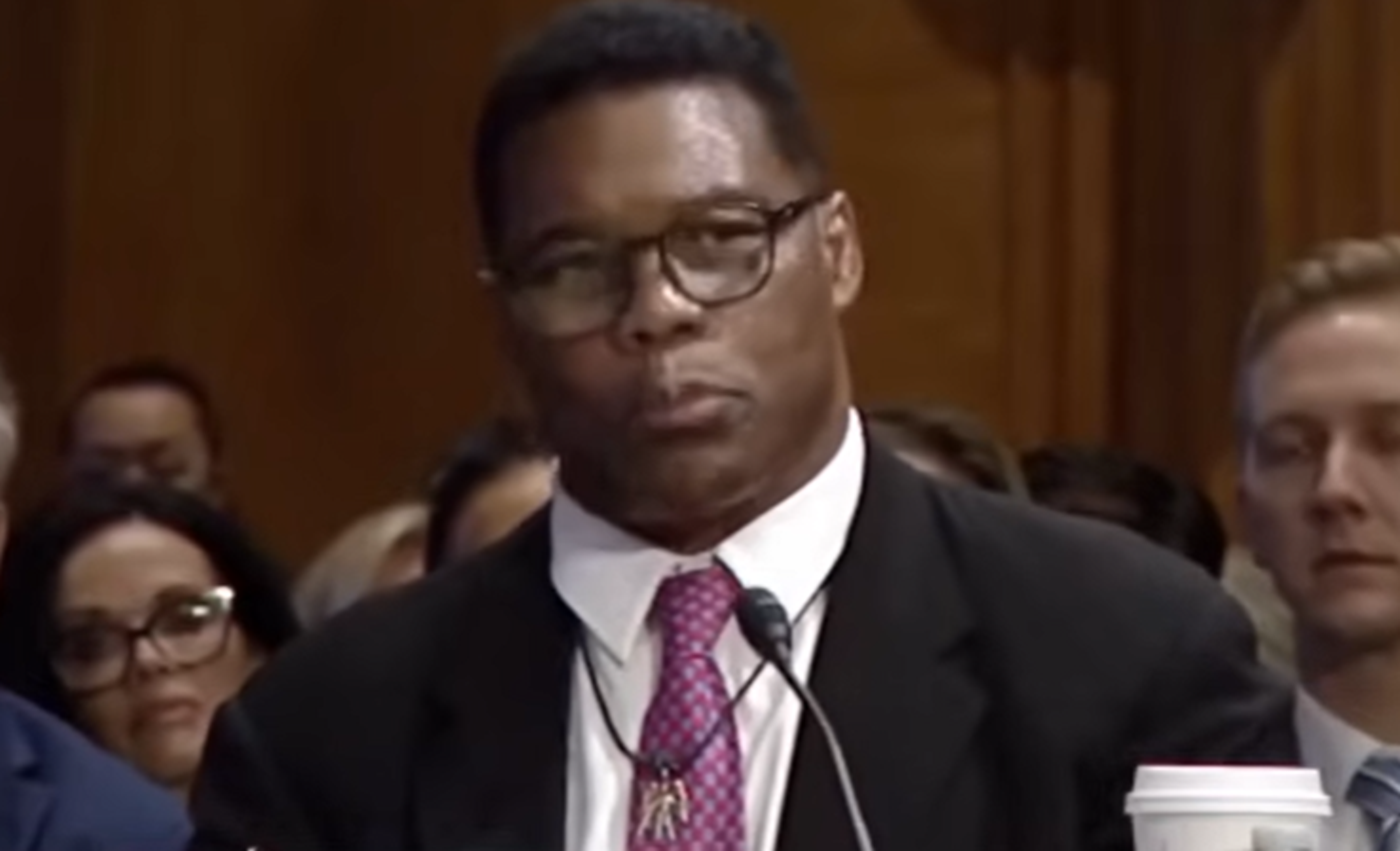Scientists discover both resilience and alarming threats in Little Inagua

A brain coral affected by Stony Coral Tissue Loss Disease (SCTLD) in Little Inagua.
Aug 29, 2024 – NASSAU | A recent scientific expedition led by the Perry Institute for Marine Science (PIMS), with participation from The Bahamas National Trust (BNT), has uncovered critical insights into the health of coral reefs and seagrass beds surrounding Little Inagua, a secluded island in the southern Bahamas. The International SeaKeepers Society provided significant financial support and facilitated the expedition by connecting the team with the research vessel Awatea. The findings could play a crucial role in shaping future conservation strategies for one of the Caribbean’s most pristine marine ecosystems.
Last month’s mission was the first of its kind in over a decade and explored the island’s remote underwater habitats within the protected boundaries of the Little Inagua National Park. Spanning approximately 62,800 acres, it is The Bahamas’ third-largest national park and the largest uninhabited island in the region, remaining a beacon of untouched biodiversity. Yet, as the research team discovered, even these isolated waters are not immune to the pressures threatening marine life globally.
Stony Coral Tissue Loss Disease (SCTLD) is a rapidly spreading threat in The Bahamas and the wider Caribbean, affecting over 20 coral species. The disease causes corals to lose tissue quickly, often leading to death and endangering the reefs that protect coastlines and support fisheries.
“Our surveys revealed both hope and concern,” said Dr. Krista Sherman, Senior Scientist at PIMS and the expedition’s lead researcher. “While we found resilient coral colonies and thriving seagrass beds that support critical fisheries, we also documented signs of Stony Coral Tissue Loss Disease (SCTLD) and bleaching that highlight the fragility of these ecosystems.”

Healthy seagrass beds in Little Inagua, providing essential habitat and supporting the rich biodiversity of the region’s marine life. Photo Credit: Haley Davis, SeaKeepers
“This park is one of 33 national parks managed by BNT, but it has been, for many years, a mystery. It’s remote, a bit secluded, and yet so beautiful,” said Lindy Knowles, Senior Science Officer at BNT. “We now have a better idea of how the habitats in the park are doing. Corals have been bombarded by SCTLD but the seagrass beds are intact, which shows that the entire system is relatively stable.”
Resilience Amidst Challenges: The Findings
The expedition’s team, comprising scientists from PIMS and BNT, surveyed 17 sites, including 13 coral reefs and four seagrass beds, some of which were last studied in 2011. The assessment revealed both promising and concerning results. Encouragingly, large colonies of mountainous star corals (Orbicella species) and boulder corals exhibited strong health, with no signs of disease or bleaching in certain locations. However, these bright spots were overshadowed by the widespread death of pillar corals (Dendrogyra cylindrus) and the death of historically robust stands of elkhorn (Acropora palmata) and staghorn corals (Acropora cervicornis) from bleaching.
Dr. Valeria Pizarro, senior scientist and coral expert at PIMS, emphasized the significance of these findings. “I was so happy to see juveniles of the smooth flower coral after SCTLD has killed most of these colonies in other parts of The Bahamas. Unfortunately, pillar coral, also known as the Caribbean unicorn, seems to be wiped out by SCTLD. We only saw standing dead colonies.”

Queen conch thriving in the seagrass beds of Little Inagua, a key species for both local fisheries and marine biodiversity, highlighting the importance of protecting these vital habitats. Photo Credit: Haley Davis, SeaKeepers
While the coral reefs showed mixed signs of health, the seagrass beds remain in good condition, providing essential habitat for commercially valuable species.
A Glimpse into Little Inagua’s Rich Marine Life
Despite the challenges facing the coral reefs, Little Inagua’s waters continue to support diverse marine life. The team reported sightings of turtles, stingrays, and various shark species, along with large predators like groupers, snappers, and barracudas. Dr. Krista Sherman, Senior Scientist at PIMS and the expedition’s lead researcher, commented: “I don’t remember ever seeing so many coneys and barracudas. It was also really cool to consistently see black durgon and sargassum triggerfish at some sites since they’re not typical in other parts of the country.”
Economically important species like the Caribbean spiny lobster (Panulirus argus) and queen conch (Aliger gigas) were also observed in abundance, signaling potential long-term benefits for surrounding fisheries.
A Mission Made Possible Through Collaboration
The expedition’s success was the result of collaboration between multiple organizations, including PIMS, BNT, and SeaKeepers. The research team spent nearly two weeks aboard Awatea, a 63-foot sailing catamaran provided through SeaKeepers’ DISCOVERY Yacht Program. By utilizing this incredible resource, the expedition not only minimized its carbon footprint but also significantly reduced costs compared to chartering a vessel independently.
Haley Davis, Citizen Science Manager for SeaKeepers, expressed pride in supporting the mission: “We are excited about the opportunity to engage private vessels for important scientific work and we are more than happy to have used the Awatea as a low-carbon option for this two week liveaboard voyage.”

Lindy Knowles from the Bahamas National Trust conducting a survey of seagrass beds in the pristine waters of Little Inagua, as part of an expedition to assess and protect vital marine habitats. Photo Credit: Haley Davis, SeaKeepers
The expedition was funded through a grant to the Perry Institute for Marine Science from the Moore Bahamas Foundation, The Bahamas National Trust, and SeaKeepers.
Looking Ahead: The Future of Little Inagua’s Conservation
While it may be years before another comprehensive survey is conducted in this remote region, the data gathered will inform ongoing conservation efforts and provide a baseline for measuring future changes. Dr. Sherman said: “The data we collected over the course of this expedition will be analyzed in the coming months. This information will be important to help protect biodiversity and preserve the integrity and function of Little Inagua’s marine ecosystems.”
As The Bahamas faces escalating environmental challenges from climate change, coral disease, overfishing, and pollution, the insights from Little Inagua highlight both the vulnerabilities and strengths of its marine environments. The findings are a reminder that even in the most remote corners of the archipelago, urgent action is needed to preserve the country’s natural heritage for generations to come.
Link to expedition video footage: https://vimeo.com/995499389/cec871e358

Healthy boulder star corals thrive in the protected waters of Little Inagua, highlighting the resilience and beauty of these coral colonies despite environmental challenges.
About the Perry Institute for Marine Science (PIMS)
For over 50 years, the Perry Institute for Marine Science (PIMS) has been at the forefront of marine research and conservation in The Bahamas and the Caribbean. Our mission is clear: leading through science, we innovate solutions, create opportunities, and inspire action to protect and restore ocean life for people and the planet. Our vision? Thriving seas and empowered communities.
From our beginnings as the most productive marine lab and field station in the world on Lee Stocking Island, we’ve evolved into a global, program-based non-profit tackling critical issues such as coral reef restoration, fisheries conservation, and the protection of mangrove and coastal ecosystems. Our holistic approach integrates cutting-edge scientific research with community education and engagement, as well as international collaboration to make lasting impacts on marine environments.
At PIMS, we’re more than just scientists—we’re educators, advocates, and partners. We empower local communities, provide pathways to conservation careers, and work tirelessly to protect and restore the ocean ecosystems that are vital to both biodiversity and human well-being.
About The Bahamas National Trust
The Bahamas National Trust (BNT) was created by an Act of Parliament in 1959 to build and manage the national park system of The Bahamas. Possibly the only non-governmental organization in the world charged with such a responsibility, the BNT works daily to conserve and protect the natural resources of The Bahamas through science, stewardship, and education for present and future generations. There are currently 33 National Parks managed by the BNT, with more than 2 million acres of marine and terrestrial areas protected.

In stark contrast, bleached star coral colonies in Little Inagua reveal the severe toll environmental stressors can take on marine ecosystems.
About The International SeaKeepers Society
The International SeaKeepers Society is a not-for-profit 501(c)(3) organization that facilitates oceanographic research, conservation, and education through direct involvement with the yachting community. Providing educational resources and hands-on marine science experiences to students is the primary focus for ensuring the wellbeing of our planet. SeaKeepers enables the yachting community to take full advantage of their unique potential to advance marine sciences and raise awareness about global ocean issues.
Founded in Monaco in 1998, The International SeaKeepers Society has been supporting ocean conservation through direct involvement with the yachting community for more than twenty-five years. What started as a data collection program aboard select luxury yachts, has evolved to engage thousands of participants annually with at-sea and coastal programming. Today SeaKeepers’ mission is focused on the DISCOVERY Yacht Program which is comprised of Scientist-Led Expeditions, Citizen Science, Educational Outreach, and Community Engagement.
As a catalyst working with governments, scientists, institutions, and other marine organizations to further its mission, SeaKeepers supports sensible, achievable marine protection and restoration. Activities take place globally through the efforts of headquarters based in the United States with offices located on the east and west coast, and international representation in Singapore, the United Kingdom, and the South Pacific. For more information, please visit www.seakeepers.org.

Dr. Krista Sherman

Lindy Knowles

Dr. Valeria Pizarro

Haley Davis, Citizen Science Manager
Dr. Krista Sherman, Lindy Knowles, and Dr. Valeria Pizarro, key leaders of the expedition studying Little Inagua’s coral reefs and seagrass beds, working together to uncover vital insights for conservation.
Haley Davis, Citizen Science Manager at The International SeaKeepers Society, who facilitated the expedition by connecting the research team with the vessel Awatea.


 TCI News1 week ago
TCI News1 week ago
 Bahamas News5 days ago
Bahamas News5 days ago
 Caribbean News6 days ago
Caribbean News6 days ago
 TCI News4 days ago
TCI News4 days ago
 Bahamas News8 hours ago
Bahamas News8 hours ago
 Caribbean News1 week ago
Caribbean News1 week ago






























